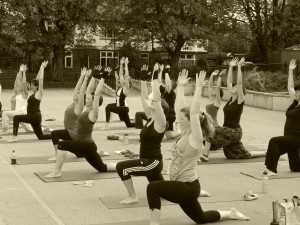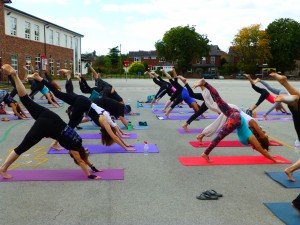Please beware that this blog contains information on some sensitive topics and may not be suitable for all readers.
When in Nigeria I visited Action Health Incorporated (AHI). I went with Yemi from Hope for HIV/AIDS International to be shown round the facilities by Mavis, an intern at the organisation. AHI is a huge non-governmental organisation (NGO) for young people 10 – 21 years of age. AHI is dedicated to the promotion of adolescent health and development.
During the visit to AHI I was fortunate enough to talk to the programme officer dealing with the counseling and advice part of AHI in their youth clinic. The AHI provides youth friendly sexual health and personal development advice through student doctor placements that rotate monthly supported by a permanent advisor.
I discussed some questions that I had about the sexual health service with Oladimeji, the programme officer. Through our discussion I was able to broaden my knowledge surrounding Nigerian health provision and the legal situation of healthcare. I found that HIV testing at the clinic is only available to those over 18 years of age and that both HIV and blood pregnancy tests are done on site. The morning after pill is also permitted and is prescribed. However, abortions are not permitted unless the pregnancy is affecting the health of the woman and until recently a woman was only able to have an abortion if the husband agreed. Thankfully, the rights of the mother now supersede the wishes of the husband and if any woman dies in labour the entire delivery team must appear before a medical panel to explain why. Women are also now allowed to control their own contraception whereas before they were not permitted to without the signed permission of the husband. However, the prescription of regular birth control for young women is severely limited as there are fears about a community backlash against the clinic, and parents suing.
At the clinic they provide free male and condoms and also run a peer education programme with local schools on sexual health awareness. Even though AHI provides sexual health screening and contraception their central message is abstinence. I asked why this is and I got a culturally relevant response. The answer explored the difficulties of navigating the cultural response (and potential isolation) regarding sex outside of marriage as well as the impacts of poverty on many young peoples access to sexual health services. Many young people just can’t afford to get to a sexual health clinic and can’t risk going to a clinic in their local community. Many more people can not afford to feed themselves let alone support a child. I must remind you at this stage that Nigeria is one of the richest African nations and that whilst there is extreme poverty there is also wealth that most people have never seen the likes of.
Another discussion I had focused on child protection. I found out that the rights of the child only came into focus in 2010 and before this point they were not legislated for. However, when it comes to issues of protecting a child especially when it comes to sexual harassment and abuse the law does little in the face of such extreme poverty. Allegations of abuse in the area of Lagos rarely get explored because the person being abused will often be cultural isolated, whilst the perpetrator is often defended. Most abuse cases that were recalled to me involved richer relatives abusing girls that were already promised to them for marriage. In such cases the abuse often happened with the consent or without intervention from the parents because of the financial importance of such a marriage. There are many other cases in which abuse allegations will be settled financially out of court and many don’t even get to court because the parents chose whether or not to take it further. Whilst on a personal level I find this part of Nigerian culture abhorrent the western world is not immune to such violations. The abuse of children is global and before you sit back and criticize Africa you only have to look at the many stories of abuse, particularly in the church, children’s homes and the family to see that we all have to act now in the face of such unspeakable evil.
To find out more about AHI you can go to the website at: www.actionhealthinc.org
If you want more information about recognizing and dealing with abuse you can go to: http://helpguide.org/mental/child_abuse_physical_emotional_sexual_neglect.htm


